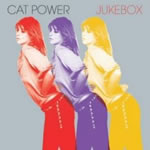|
|
 |
Dusted Reviews
Artist: Cat Power Album: Jukebox Label: Matador Review date: Jan. 17, 2008 |

|
|
|
 |
Before Chan Marshall’s famously uneven live performances were scrutinized as a window into her fragile psyche, before she started hawking for Chanel and it was deemed important to know her preferred brand of heels (Christian Louboutin – hat tip The New Yorker), Cat Power was mostly just a voice – an arresting voice, unmistakably Southern, preternaturally haunting. On the earliest records – still and probably forever her best – that voice claws at locked doors (“We All Die”), seethes at enigmatic aggressors (“Nude As The News”), and moans in weary resignation (“Ice Water”). Framed by Tim Foljahn’s splintered chords and Steve Shelley’s drumming, records like Myra Lee and What Would the Community Think? are less a blueprint for Chan Marshall’s “mature” phase than harrowing, emotionally untenable shards littering the path to it.
Much has been made, in the last year or two, of Cat Power’s commercial and artistic transformation. Not that she’s ever been a slouch at selling records, but 2006’s The Greatest – boasting a supporting cast of Memphis session legends – bumped her into a new tier, replete with copious commercial tie-ins. Her success coincided with curbing a substance abuse problem, which in turn allowed her to take the stage more comfortably.
It’s a great development, but her music has lost a great deal of bite in the process. Technically impressive and uniformly pleasant, her 2006 soul record is in many respects her least soulful release. If the haunted qualities of Chan Marshall’s early records go hand-in-hand with her self-destructive history, it’s irresponsible to wish for their return. But it’s also difficult to gloss over their absence.
Jukebox, Marshall’s eighth record, is as reflective of the current phase of her career as 2000’s The Covers Record was of earlier days. Propped up by a backing cast that includes Jim White on skins – always distinctive, though less-so here – and the Blues Explosion’s Judah Bauer on guitar, the record boasts a higher proportion of songs by icons – Frank Sinatra, Hank Williams, James Brown, and Bob Dylan – to match its stately, self-important air. The opener, “New York,” tries a similar trick to 2000’s “Satisfaction,” disrupting the cadence of the Sinatra original in order to iron its punchy jubilance into something more slithering and coy. For the most part, Marshall wraps herself inside the bluesy instrumentation; there’s a second when her voice climbs up to thrillingly toy with the hairs on the back of the neck (“Wanna wake up in a city that doesn’t sleep”) but she’s otherwise determined to strike a careful balance.
The record’s strongest stretch begins with a stripped-down take on the Highwaymen’s “Silver Stallion.” Embroidered with elegiac shimmers of steel guitar, it’s one of the few tracks that places Marshall’s voice way out in front, refusing to bury her breathy textures beneath by-the-numbers instrumentation. “Aretha, Sing One For Me” is strong despite representing something of a missed opportunity for Marshall to really bust out; her band plays it uncharacteristically loose, with White digging in with a series of sticky snare fills. The gauzy, last-dance quality of the George Jackson original is shaken loose by organ notes that press and hold a half-beat long – everything seems to be inviting Marshall to leap an octave and play diva, but she plays it pretty close to the vest. More expressive is the breathy, disco ball twinkle of James Brown’s “Lost Someone,” where Marshall alternates between the breathy come-on of the opening notes and the soaring, gutsy plea to “Help me / Help me please.”
The weakest stretch is the album’s conclusion, comprised of ponderous, piano-heavy covers of Billie Holiday, Janis Joplin and Joni Mitchell. Before Marshall gets there, however, she serves up one of two originals (the first of which is an unnecessary reworking of Moon Pix’s “Metal Heart”). “Song to Bobby” follows a lackluster reading of Dylan’s “I Believe In You,” and impressively fluctuates between mugging like Bob, with little low-octave flourishes, and lifting into a lilting love-letter from a fan. It’s one of the records sweetest, most unselfconscious moments.
Despite a smattering of highlights, there’s no gut-punch anywhere on Jukebox. The emotional gulf that exists between Marshall’s cover of Hank Williams’ “Still In Love” on Myra Lee – one of her best songs, full stop – and her equally transformative but utterly hollow reading of Williams’ “Ramblin’ Woman” on Jukebox is vast. I don’t doubt that there are many who will prefer the latter, but they’re probably more likely to know why it’s important that Marshall performs in those Louboutin heels.
By Nathan Hogan
|







